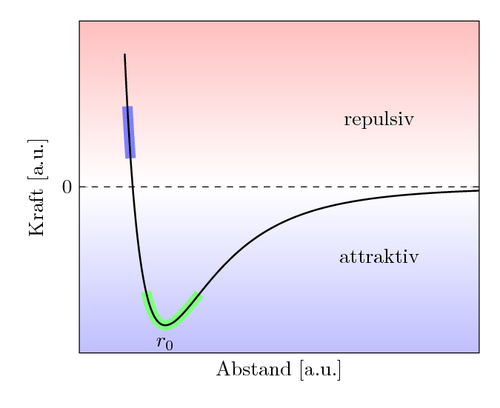Here we can see how parts of a curve can be emphasized. A color shading partitions the plane.
The code is from a question by lorbj on TeXwelt.de http://texwelt.de/wissen/fragen/9875/numerisches-problem-mit-pgfplots and from the answer by Elke Schubert.
Edit and compile if you like:
\documentclass[border=10pt]{standalone}
\usepackage{pgfplots}
\pgfplotsset{compat=1.10}
\begin{document}
\begin{tikzpicture}
\begin{axis}[domain = 0.97:2.3,
samples = 100,% <- nur 100 statt 400
xmin = 0.8,
xmax = 2.3,
ymin = -0.3,
ymax = 0.3,
ytick = \empty,
xtick = \empty,
xlabel = {Abstand [a.u.]},
ylabel = {Kraft [a.u.]},
extra y ticks = {0},
xlabel near ticks,
ylabel near ticks,
set layers,
]
\begin{pgfonlayer}{axis background}
\fill[shade, top color=blue!0, bottom color=blue!25]
(rel axis cs:0,0)--(rel axis cs:1,0)--
(rel axis cs:1,0.5)--(rel axis cs:0,0.5)--cycle;
\fill[shade, top color=red!25, bottom color=red!0]
(rel axis cs:0,0.5)--(rel axis cs:1,0.5)--
(rel axis cs:1,1)--(rel axis cs:0,1)--cycle;
\end{pgfonlayer}
\addplot[line width=5pt,color = green!50, domain = 1.05:1.25]
{1/x^12-1/x^6};
\addplot[line width=5pt,color = blue!50, domain = 0.98:0.992]
{1/x^12-1/x^6};
\addplot[thick,
samples=400% 400 für die Gesamtkurve
] {1/x^12-1/x^6};
\node[anchor= north] at (axis cs: 1.122462048,-0.26) {$r_0$};
\draw[dashed,thin] (axis cs: 0.8, 0 )-- (axis cs: 2.3, 0);
\node[anchor = north] at (rel axis cs:0.75,0.75) {repulsiv};
\node[anchor = south] at (rel axis cs:0.75,0.25) {attraktiv};
\end{axis}
\end{tikzpicture}
\end{document}
